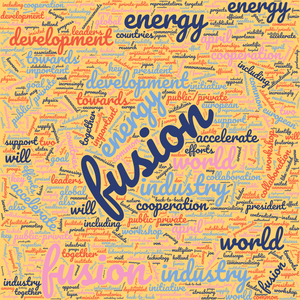Increased awareness in a changing landscape
The world of fusion research is changing fast, and world leaders are taking notice. The large public projects that occupied centre stage for the past decades are now sharing it with an ever-growing number of private startups. The Fusion Industry Association reports that in about five years, private fusion entities have more than doubled in number to close to sixty overall, and total private investment in the fusion sector has surpassed USD 6 billion.
Whereas public projects are largely oriented towards proving the scientific and industrial feasibility of fusion, private companies, by nature, are concerned with the economic viability of producing and eventually commercializing fusion energy. However, these two "cultures" are not by any means opposed or contradictory—instead, they can form the basis of efficient synergies that will accelerate progress towards the common goal of harnessing fusion energy.
World institutions and world leaders are increasingly aware of the multiplier effect that public-private collaboration could have. The International Atomic Energy Agency (IAEA) recently established the World Fusion Energy Group, an initiative to encourage cross-sector collaboration in the fusion industry. And in back-to-back announcements last week, world leaders from Japan, the United States and Europe also indicated their intention to promote the development of fusion through targeted support efforts including for public/private cooperation.
On 10 April, Japanese Prime Minister Fumio Kishida and US President Joe Biden announced a joint partnership to accelerate the development and commercialization of nuclear fusion, including efforts to "identify and support the development of resilient global supply chains that facilitate commercial fusion deployment, welcoming and considering discussions among fusion industry groups in the respective countries." Andrew Holland, the head of the Fusion Industry Association praised the initiative, saying: "Fusion is too important for needless competition: like-minded countries should work together towards the common goal."
And on 11 April during a visit to the Max Planck Institute for Plasma Physics in Garching, Germany, Ursula von der Leyen, president of the European Commission, insisted on the importance of promoting "more public-private research partnerships" and encouraged industry to invest [...] even more in fusion technology."
Fostering ways to accelerate the development of public/private cooperation in fusion energy will also be the subject of two important workshops in the next weeks and months. The European Commission's Directorate-General for Energy is bringing together key fusion stakeholders in Strasbourg, France, on 23 April to discuss cooperation mechanisms between governments, laboratories and industry. And the ITER Organization—the global leader in multinational fusion collaboration—is hosting a key workshop in the context of this renewed landscape. On 27-29 May, ITER's Inaugural Private-Public Fusion Workshop will be attended by the representatives of approximately 50 fusion startups from around the world.


